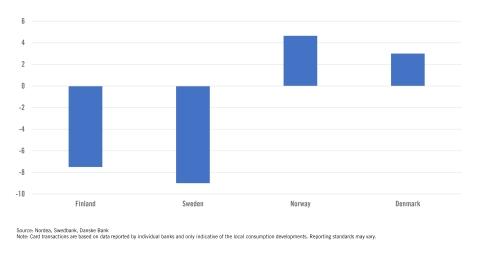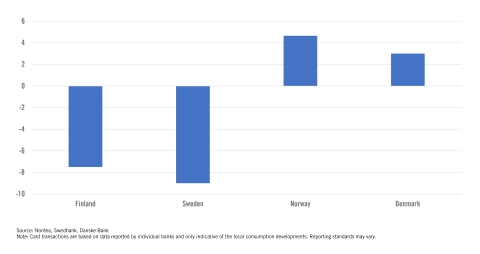HELSINKI--(BUSINESS WIRE)--Easing lockdown measures is not enough to put the economy back on track. Instead, besting the fear of a spreading coronavirus will be crucial. This interpretation is supported by the economic developments of Nordic countries, says Sanna Kurronen, lead economist of Finnish think tank, Finnish Business and Policy Forum EVA.
Despite resorting to much looser lockdown measures than its neighbours, Sweden’s economy has suffered just as much. Nevertheless, through examining credit card data from Denmark and Norway, two countries that quickly implemented strict measures to fight the spread of the virus, a relatively fast recovery can be identified.
In Sweden, the initial drop in consumption according to credit card transaction data was the smallest of the four Nordic countries, with card transaction volumes falling around 15 per cent year-on-year in late-March and early-April. In the other Nordic countries, the drop was between 20 per cent and 25 per cent. However, the recovery has not been rapid in Sweden, as in mid-June credit card payments were still roughly 8 per cent below the previous year. Like elsewhere, the demand for services is far below normal levels too.
As the virus is now well contained, the recovery has been swifter in the remaining Nordic countries. Latest numbers from mid-June show that purchases in Denmark were already topping those of the previous year, and even payments in restaurant were only 10 per cent lower than in 2019.
Of the four Nordic countries, Denmark and Norway imposed the strictest measures, locking down schools and big parts of retail services, and by limiting meetings to ten people. Finland followed suit, but did not close businesses, apart from restaurants. Sweden kept schools open for children under 16, and allowed businesses to operate, settling for mere recommendations of social distancing in order to slow down the epidemic.
Denmark was among the first countries to start removing restrictions by first opening primary schools and some retail services in April. As infections were at low levels, consumers soon returned to stores and restaurants. Next came Norway, followed by Finland a few weeks later, by opening schools and services. As new infections are few in Norway, Denmark, and Finland, domestic demand is recovering rapidly.
“Growing evidence seems to favour the notion, that instead of lockdown measures, it is primarily fear that guides citizens’ economic behaviour in the Covid Crisis. In the US, states that have removed lockdown measures before the virus is under control have not managed to revive their economy. Particularly high-income consumers stay at home, probably because they have the possibility. If the virus is spreading, consumers restrict their own behavior as they try to avoid getting infected or infecting others”, says lead economist Sanna Kurronen.
Dr. Kurronen emphasizes, that in terms of economic recovery, domestic consumption cannot win the war by itself. Countries, that heavily rely on exports for their livelihood, are crucially dependent on the rest of the world also overcoming the fear of the spread of the virus.
Finnish Business and Policy Forum EVA is a pro-market think tank – Aiming to promote the long-term success of the Finnish society. EVA is a non-profit association, founded in 1974.
Sanna Kurronen: Nordic Economies and the Coronavirus Crisis: Why Fear Matters More than Restrictions: www.eva.fi/en




